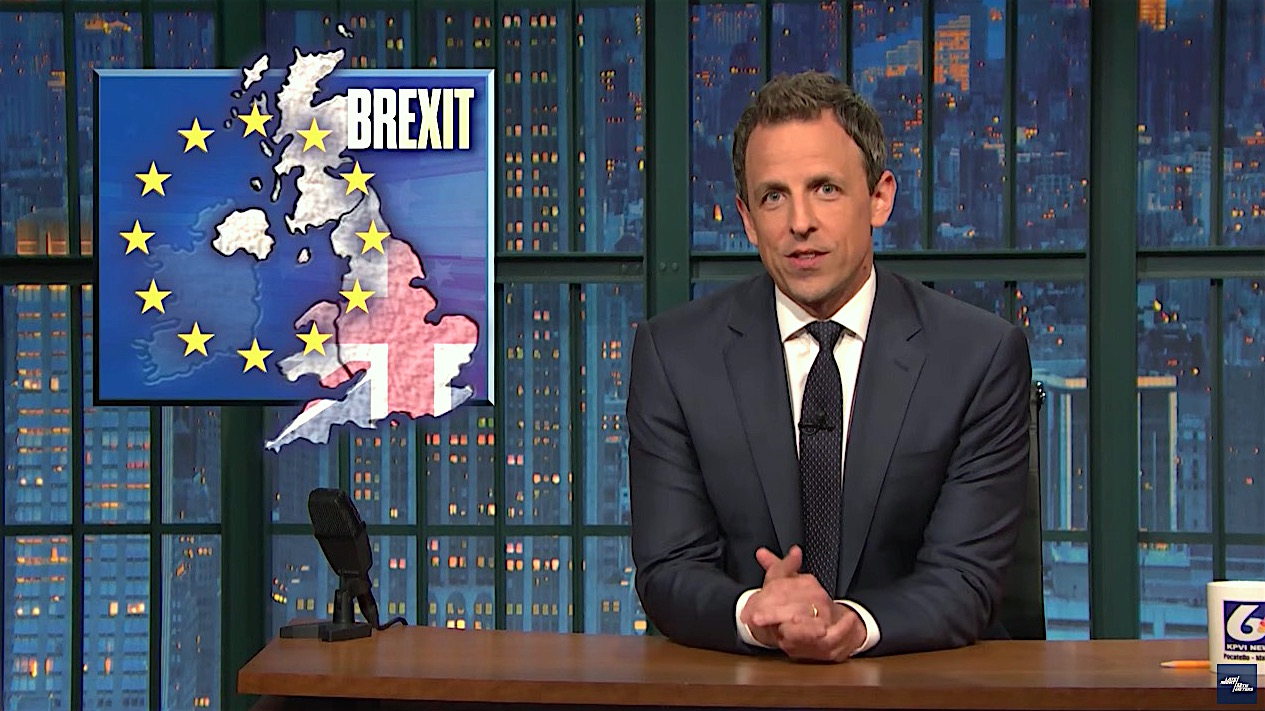Seth Meyers explains why you should care about the UK's Brexit vote on leaving the EU


A free daily email with the biggest news stories of the day – and the best features from TheWeek.com
You are now subscribed
Your newsletter sign-up was successful
Next month, Britain is voting on whether to leave the European Union, and Seth Meyers took a "keener glance" at the Brexit on Tuesday's Late Night. "A Brexit would be a huge deal," he said. "This decision could have massive ripple effects for the global economy and diplomacy for years to come — which makes it the second-most-important vote British people will cast this year." The most important vote, he joked, was to name a research ship Boaty McBoatface, and that vote was overturned. He brought it full circle, though.
"With the Brexit vote, the results can't just be ignored," Meyers said. So Prime Minister David Cameron, who opposes leaving the EU, might regret putting it to a popular vote, "because when you put things to a public vote, crazy shit happens," Meyers said. "That's true with the British Boaty McBoatface or the American Orangey McOrangeface," a reference (obviously) to Donald Trump. Then he got serious.
"The EU has always been a difficult project, partially because while these countries share a continent, they don't have a common political system or a single political identity, and those differences bubble to the surface any time they debate an issue," Meyers said. "But now that project is at a crucial moment, and the UK leaving the EU could very well be the death blow. Because it's a much bigger deal for the UK to leave than for a country like Greece leaving. Look at it this way: When Zayn left, One Direction was okay, but if Harry leaves, that's it, it's over — and the UK is Harry Styles." Watch below to see the German finance minister offer to trade Greece for Puerto Rico, and the pro-Brexit reaction to President Obama publicly opposing a British exit. Peter Weber
The Week
Escape your echo chamber. Get the facts behind the news, plus analysis from multiple perspectives.

Sign up for The Week's Free Newsletters
From our morning news briefing to a weekly Good News Newsletter, get the best of The Week delivered directly to your inbox.
From our morning news briefing to a weekly Good News Newsletter, get the best of The Week delivered directly to your inbox.

A free daily email with the biggest news stories of the day – and the best features from TheWeek.com
Peter has worked as a news and culture writer and editor at The Week since the site's launch in 2008. He covers politics, world affairs, religion and cultural currents. His journalism career began as a copy editor at a financial newswire and has included editorial positions at The New York Times Magazine, Facts on File, and Oregon State University.
-
 Ex-South Korean leader gets life sentence for insurrection
Ex-South Korean leader gets life sentence for insurrectionSpeed Read South Korean President Yoon Suk Yeol was sentenced to life in prison over his declaration of martial law in 2024
-
 At least 8 dead in California’s deadliest avalanche
At least 8 dead in California’s deadliest avalancheSpeed Read The avalanche near Lake Tahoe was the deadliest in modern California history and the worst in the US since 1981
-
 Political cartoons for February 19
Political cartoons for February 19Cartoons Thursday’s political cartoons include a suspicious package, a piece of the cake, and more
-
 ‘One Battle After Another’ wins Critics Choice honors
‘One Battle After Another’ wins Critics Choice honorsSpeed Read Paul Thomas Anderson’s latest film, which stars Leonardo DiCaprio, won best picture at the 31st Critics Choice Awards
-
 A peek inside Europe’s luxury new sleeper bus
A peek inside Europe’s luxury new sleeper busThe Week Recommends Overnight service with stops across Switzerland and the Netherlands promises a comfortable no-fly adventure
-
 Son arrested over killing of Rob and Michele Reiner
Son arrested over killing of Rob and Michele ReinerSpeed Read Nick, the 32-year-old son of Hollywood director Rob Reiner, has been booked for the murder of his parents
-
 Rob Reiner, wife dead in ‘apparent homicide’
Rob Reiner, wife dead in ‘apparent homicide’speed read The Reiners, found in their Los Angeles home, ‘had injuries consistent with being stabbed’
-
 Hungary’s Krasznahorkai wins Nobel for literature
Hungary’s Krasznahorkai wins Nobel for literatureSpeed Read László Krasznahorkai is the author of acclaimed novels like ‘The Melancholy of Resistance’ and ‘Satantango’
-
 Primatologist Jane Goodall dies at 91
Primatologist Jane Goodall dies at 91Speed Read She rose to fame following her groundbreaking field research with chimpanzees
-
 Florida erases rainbow crosswalk at Pulse nightclub
Florida erases rainbow crosswalk at Pulse nightclubSpeed Read The colorful crosswalk was outside the former LGBTQ nightclub where 49 people were killed in a 2016 shooting
-
 Trump says Smithsonian too focused on slavery's ills
Trump says Smithsonian too focused on slavery's illsSpeed Read The president would prefer the museum to highlight 'success,' 'brightness' and 'the future'
